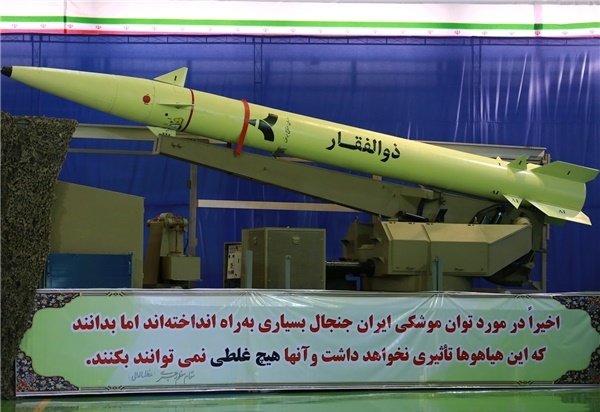ID :
418287
Sun, 09/25/2016 - 13:27
Auther :
Shortlink :
https://oananews.org//node/418287
The shortlink copeid
Iran unveils Zulfaghar long-range ballistic missile

TEHRAN, Sep. 25 (MNA) – Iran's minister of defense inaugurated Zulfaghar ballistic missile production line and announced a number of long-range missiles would be launched in near future.
Attending the inauguration ceremony of Zulfaghar ballistic missile production line, Iran's Minister of Defense Dehghan underlined that “in the field of producing solid- and liquid-fueled ballistic missiles, we can now design and build a wide range of products to cover all ranges at the highest accuracy.”
The commander underscored that Iran’s surface-to-surface missiles will be able to hit farfetched targets even on the sea.
“Within the framework of guidelines defined by the Leader and the President’s order to strengthen and develop missile defense power, the tactical missile of Zulfaghar was designed and manufactures by Iran’s skillful researchers and experts of the Aerospace Industries Organization (AIO) subsidiary of Iran's Defense Ministry,” said the official.
Hossein Dehghan emphasized that the newly-developed missile, which has successfully passed various tests, is a surface-to-surface one-stage racket which works on compound solid fuel and is able to hit and destroy targets at distances up to 700 kilometers; “other features of Zulfaghar missile include self-propelled launchers, anti-jamming systems, high precision as well as tactical style.”
Earlier, Dehghan who was attending the open session of Parliament on the occasion of Holy Defense Week, presented a report on the country’s defense capabilities.
He maintained that three more long-range missiles will be inaugurated before the end of the current Iranian calendar year (began March 20).
“Ghadir solid-fuel missile, Sejjil precision-guided missile as well as Khoramshahr missile are the three new achievements to be unveiled in near future,” he continued.
Later, Dehghan pointed to the anniversary of Samen-ol-A'emeh Operation saying “at the order of Imam Khomeini, the operation was carried out between 27-29 September 1981 and Iran broke the Iraqi Siege of Abadan to initiate a new strategy in the Imposed War.”
“After suffering losses early in the war, Saddam had to change the war strategy from short-term aggression to long-term attrition,” continued the official saying “both America and Iraq were after certain benefit and advantage in the war as well as that many Western countries provided Saddam with economic, political and intelligence support.”
He underlined that Iran mounted extensive operations to punish the intruders after breaking the Siege of Khoramshahr; “the aim was to prove to the world that Iraq was the invader and had to recompense Iran for trespassing our national territories.”
Dehghan stressed that Iran succeeded in the Imposed War since enemies failed to reach their objectives; “eight years of Sacred Defense attested the fact that culture of sacrifice and martyrdom are the only gateways to a dignified lifestyle.”
“We learnt that international organizations back arrogant countries as well as that beautiful slogans of human rights and democracy are merely means to justify acts of aggression and terrorism or a tool in the hands of those in power against the will of nations.”
The minister went on to add that the Imposed War also certified the fact that enemies would never alter their stances and exploit all possible means, including force, intrigue, conspiracy, attempt to infiltrate into the community, humiliation and insult, bait, gimmick and even smile, to reach its goals.
Presently, a pervasive instability exists inside the region and the Islamic Republic of Iran remains as the only country who seeks to settle peace and stability by exercising the greatest amount of effort to create peace and combat terrorist groups.
The only limitation of Iran’s defense capabilities is the refusal to enter the field of mass destruction and chemical weapons.
Given that Iran is being threatened by other states, no effort will be spared to develop defense equipment, said Dehghan adding “no agent can put breaks on strengthening Iran’s missile abilities.”
He further touched upon a number of measures taken at the Defense Ministry to improve efficiency of research projects; “plans have been focused on increasing the country’s deterrence power in the shortest possible time.”
Brig. Gen. Dehghan also pointed to the crucial role of the Parliament in defense sector and called on the parliamentarians to take more serious steps in development of Iranian defense industries, specially by allocating more budgets to the field.





